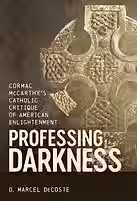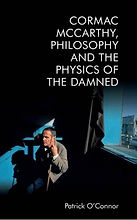Marcel DeCoste's Professing Darkness: Cormac McCarthy's Catholic Critique of American Enlightenment is out from LSU Press. In it, DeCoste argues for the centrality of Catholic thought, imagery, and sacrament in McCarthy's fiction and its relation to a critique of Enlightenment values and their often-catastrophic realization in American history.
Jonathan and Rick Elmore's edited collection The Evolving Project of Cormac McCarthy, also from LSU Press, features eleven essays from both established and up-and-coming scholars that reassess McCarthy's literary and philosophical worldview.
Brian Schill's edited collection Cormac McCarthy's Neoliberalism: Breakdown in Mercantile Ethics, from the University of Tennessee Press, includes nine essays that examine how the author's work has commented on and caricatured the economic, political, and cultural forces of neoliberalism.
From Michigan State University Press, Markus Wierschem's Cormac McCarthy: An American Apocalypse addresses the literary and mythic elements, the social dynamics of violence, and the natural world in McCarthy's fiction, and describes the literary apocalypse at the heart of his work.
Bryan Giemza's Science and Literature in Cormac McCarthy's Expanding Worlds is new from Bloomsbury Press, and in it he argues that McCarthy is the exceptional figure whose work allows and encourages us to interrogate the marriage of the sciences and humanities. Drawing from previously unsurfaced archival connections as well as a range of primary sources and interview subjects, including those close to McCarthy, Giemza places McCarthy's work within contemporary scientific discourse and literary criticism.
Steven Frye's Unguessed Kinships: Naturalism and the Geography of Hope in Cormac McCarthy is now out from the University of Alabama Press, as part of their series Studies in American Literary Realism and Naturalism. Frye considers McCarthy's work in light of literary naturalism, a more nuanced and far-reaching genus than the oversimplified Darwinism that many think of.
Dianne Luce's long-awaited chronicle of McCarthy's early career is now out with the University of South Carolina Press: Embracing Vocation: Cormac McCarthy's Writing Life, 1959-1974. Using extensive archival research, Luce tells the story of the creative evolution of McCarthy's first three novels.
Patrick O'Connor's Cormac McCarthy, Philosophy and the Physics of the Damned is now out from Edinburgh University Press. O'Connor argues that McCarthy's work articulates a distinct literary philosophy, one that pivots on themes of mortality, education, nihilism, the political, materialism, and language.
Lydia Cooper’s new book Cormac McCarthy: A Complexity Theory of Literature, is now available! Cooper combines the fields of evolutionary economics and the humanities to examine how McCarthy’s works demonstrate our need to recognize the interrelated complexities of economic policies, environmental crises, and how public policy and rhetoric shape our value systems.
Approaches to Teaching the Works of Cormac McCarthy, edited by Stacey Peebles and Ben West, has finally hit the shelves, with chapters by a number of familiar names, and guidance for teaching McCarthy in a variety of classrooms and in many different contexts--from high school to grad school, with attention to topics like region, sexuality, apocalypse, violence, leadership, borders, and ecology.









